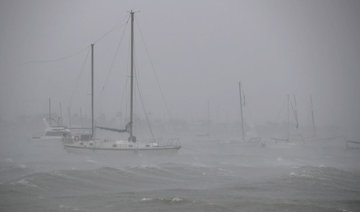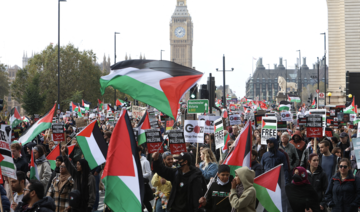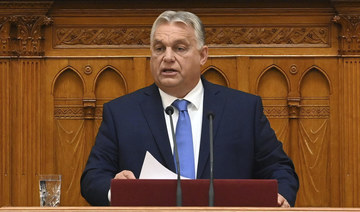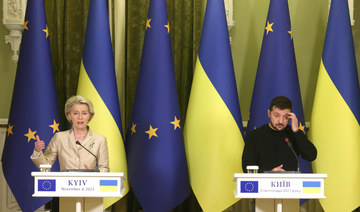MIAMI: Three people in Florida, including a sheriff’s deputy, have been killed in car crashes as Hurricane Irma closed in with high winds and lashing rain, officials said.
The hurricane bore down on southern Florida on Sunday with 130 mile-per-hour winds, flooding Miami streets and knocking out power to more than 1.6 million homes and businesses.
The storm was one of the most powerful ever seen in the Atlantic and has already killed two dozen people in the Caribbean and pummeled Cuba with 36-foot waves. Its core was located about 50 miles south of Naples by midday.
Some 6.5 million people, about a third of the state’s population, had been ordered to evacuate southern Florida.
Officials warned that Irma’s heavy storm surge — seawater driven on land by high winds — could bring floods of up to 15 feet along the state’s western Gulf Coast. It submerged the highway that connects the isolated Florida Keys archipelago with the mainland and small whitecapped waves could be seen in flooded streets between Miami office towers.
“There is a serious threat of significant storm surge flooding along the entire west coast of Florida,” Gov. Rick Scott told a press conference. “This is a life-threatening situation.”
Irma is expected to cause billions of dollars in damage to the third-most-populous US state, a major tourism hub with an economy comprising about 5 percent of US gross domestic product (GDP).
At least 1.6 million Florida homes and businesses had lost power, according to Florida Power & Light and other utilities.
The National Hurricane Center forecast that its center eye will move near or over the state’s west coast later.
The storm winds downed a construction crane and shook tall buildings in Miami, which was about 95 miles from Irma’s core.
Deme Lomas, who owns Miami restaurant Niu Kitchen, said he saw a crane torn apart by winds and dangling from the top of the building.
“We couldn’t hear it come down because of the loud wind, but when we just took a look it was pulled apart into a mess,” Lomas said in a phone interview from his 35th-floor apartment. “We feel the building swaying all the time ... It’s like being on a ship.”
Miami streets were flooded as the water crept up on and around Brickell Avenue, which runs around 550 feet from the waterfront through the city’s financial district and newly built high rises.
“There’s water everywhere,” said Chaim Lipskar, rabbi at the Rok Family Shul that is sheltering a few families through the storm. “It’s up and down Brickell and all over the side streets.”
South Florida’s large population of elderly residents posed a severe test for the emergency shelters, many of which were not equipped for people with elaborate medical needs.
Irma is now a Category 4 storm, the second-highest designation on the Saffir-Simpson scale.
One woman in Miami’s Little Haiti neighborhood delivered her own baby, with medical personnel coaching her on the phone because emergency responders were not able to reach her, the city of Miami said on Twitter. The two are now at the hospital, it said.
Irma comes just days after Hurricane Harvey dumped record-setting rain in Texas, causing unprecedented flooding, killing at least 60 people and leaving an estimated $180 billion in property damage in its wake. Almost three months remain in the Atlantic hurricane season, which runs through November.
US President Donald Trump spoke to the governors of Alabama, Georgia, South Carolina and Tennessee on Sunday and issued a disaster declaration for Puerto Rico, which was hit by the storm last week, the White House said.
3 dead as Hurricane Irma batters Florida with high winds, heavy rain
3 dead as Hurricane Irma batters Florida with high winds, heavy rain

UK minister accused of ‘witch hunt’ against pro-Palestine movement

- Michael Gove: University encampments represent ‘antisemitism repurposed for Instagram age’
- Palestine Solidarity Campaign: Britain ‘complicit’ in ‘genocide in Gaza’
LONDON: The UK’s secretary of state for leveling up, housing and communities has been accused of conducting a “witch hunt” after accusing pro-Palestinian demonstrators of antisemitism.
Political parties and the Palestine Solidarity Campaign condemned Michael Gove, with the Revolutionary Communist Party calling his accusations an attempt to distract from the Conservatives’ “support for genocide” in Gaza.
The Socialist Workers Party said he is conducting a “witch hunt (against) the Palestine solidarity movement.”
Gove announced plans to make protest organizers foot the cost of policing at pro-Palestinian demonstrations, saying they are not doing enough to stop some attendees spreading anti-Jewish messages.
“Many of those on these marches are thoughtful, gentle, compassionate people — driven by a desire for peace and an end to suffering. But they are side by side with those who are promoting hate,” he added.
“The organizers of these marches could do everything in their power to stop that. They don’t.”
Gove also said pro-Palestinian university encampments across the UK represent “antisemitism repurposed for the Instagram age,” and their presence has facilitated hostility against Jewish students on campuses.
Ben Jamal, PSC director, said in a statement: “Apologists for Israel’s genocidal violence and system of apartheid have lost the democratic and legal arguments, but continue to attempt to delegitimize Palestinian solidarity. They will not succeed.
“At a moment when Israel is on trial in the world’s highest court for the crime of genocide and the day after its Prime Minister has been threatened with ICC (International Criminal Court) arrest warrants for war crimes, it is grotesque that these smears continue.
“The real issues are that the UK government continues to arm Israel, refuses to resume funding to UNRWA (the UN Relief and Works Agency for Palestine Refugees), and is attempting to protect Israel from legal accountability.
“Far from stopping the genocide in Gaza as required under international law, the UK is complicit.”
NGOs seek climate trial of French oil giant TotalEnergies

- The complaint was filed at Paris judicial court days before TotalEnergies holds annual shareholders meeting
- The offenses carry prison sentences ranging between one year to five years and fines of as much as $163,000
PARIS: NGOs filed a criminal complaint against French oil giant TotalEnergies and its top shareholders in Paris on Tuesday, seeking a trial for involuntary manslaughter and other consequences of climate change “chaos.”
The case targets the company’s board, including chief executive Patrick Pouyanne, and major shareholders that backed its climate strategy, including US investment firm BlackRock and Norway’s central bank, Norges Bank.
In a statement, the three NGOs and eight individuals said they accused the group of “deliberately endangering the lives of others, involuntary manslaughter, neglecting to address a disaster, and damaging biodiversity.”
The complaint was filed at the Paris judicial court, which has environmental and health departments, three days before TotalEnergies holds its annual shareholders meeting.
The prosecutor now has three months to decide whether to open a judicial investigation, the NGOs said. If it does not go ahead, the plaintiffs can take their case directly before an investigative judge.
The offenses carry prison sentences ranging between one year to five years and fines of as much as 150,000 euros ($163,000).
“This legal action could set a precedent in the history of climate litigation as it opens the way to holding fossil fuel producers and shareholders responsible before criminal courts for the chaos caused by climate change,” the NGOs said.
The plaintiffs include “victims or survivors of climate-related disasters” in Australia, Belgium, France, Greece, Pakistan, the Philippines and Zimbabwe.
TotalEnergies did not immediately return a request for comment.
Oil and gas companies, other corporations and governments are facing a growing number of legal cases related to the climate crisis worldwide.
TotalEnergies is facing other legal cases in France related to climate change.
Outside the Paris judicial court, the NGOs held a banner reading “climate change kills” and “let’s put shareholders behind bars” — with the “share” in shareholders crossed out and replaced by the “death.”
The latest complaint aims to “recognize the deadly consequences of their decisions, their stubbornness in voting for fossil projects which threaten the stability of the climate and therefore of all living things,” Claire Nouvian, founding director of conservation group Bloom, said at a news conference.
Fossil fuels — oil, gas and coal — are the biggest contributors to heat-trapping greenhouse gas emissions.
One of the plaintiffs in the Paris case is Benjamin Van Bunderen Robberechts, a 17-year-old Belgian whose friend Rosa died in flash floods in Belgium at the age of 15 in 2021.
In Paris to file the complaint, he said he had come to “demand justice” against those “who choose profit over human lives and climate.”
In their statement, the plaintiffs said “TotalEnergies has known the direct link between its activities and climate change” since at least 1971.
“TotalEnergies followed a climate skeptic line in order to waste time, delay decision-making and protect its increasing investments in fossil fuels,” they added.
They said they hope to set a legal precedent “whereby opening new fossil fuel projects would be considered criminal.”
While the case was filed on Tuesday, TotalEnergies announced a deepwater project off the coast of Angola, with production set to start in 2028 to extract 70,000 barrels per day.
Gunmen kill around 40 people in attack in northcentral Nigeria: official

- Armed men invaded Zurak community, shooting sporadically and torching houses
- Local youth leader Shafi’i Sambo also said at least 42 people had been killed in the raid
LAGOS: Gunmen riding motorbikes killed around 40 people in a raid on a mining community in northcentral Nigeria, opening fire on residents and torching homes, the local government said on Tuesday.
The attack late on Monday on Wase district in Plateau state was the latest violence in an area which has long been a flashpoint for disputes over resources and for outbreaks of intercommunal clashes.
Armed men invaded Zurak community, shooting sporadically and torching houses, Plateau state commissioner for information Musa Ibrahim Ashoms told AFP by telephone.
“As we speak, about 40 people have been confirmed dead. Zurak is a popular mining community,” he said.
Local youth leader Shafi’i Sambo also said at least 42 people had been killed in the raid.
Wase has deposits of zinc and lead, while Plateau as a whole is known for its tin mining industry.
Sitting on the dividing line between Nigeria’s mostly Muslim north and predominantly Christian south, Plateau often sees outbreaks of violence sparked by disputes between nomadic herders and pastoral farmers.
Climate change has also helped escalate tensions over grazing land, water access and other resources such as the state’s metal reserves.
Parts of northwest and northcentral Nigeria have also been terrorized by heavily armed criminal gangs, who raid villages to loot and carry out mass kidnappings for ransom.
In January, intercommunal clashes erupted in Plateau’s Mangu town that left churches and mosques burned, more than 50 people dead and thousands displaced.
Over 3,000 Ukrainian inmates seek to join military

- Ukraine is suffering critical ammunition and manpower shortages on the battlefield
- “We predicted this before the adoption of this law,” Deputy Minister of Justice Olena Vysotska said
KYIV: Thousands of Ukrainian inmates are seeking to join the military, Kyiv said Tuesday, following a decision by lawmakers enabling some categories of prisoners to join the armed forces.
The move echoes a policy in Russia, where tens of thousands of prisoners have been sent to Ukraine with the promise of amnesty and were killed in gruelling battles that produced few gains.
Ukraine is suffering critical ammunition and manpower shortages on the battlefield that have allowed Russian forces to advance on the eastern and northern front lines.
“This is more than 3,000 people. We predicted this before the adoption of this law,” Deputy Minister of Justice Olena Vysotska said, referring to the number of prisoners who have submitted applications to join the military.
She said authorities had identified 20,000 eligible prisoners and that of them, 4,500 had “expressed interest” in joining. She added that the figure was likely to fluctuate.
Only prisoners with fewer than three years left on their sentence can apply. Mobilized prisoners are granted parole rather than a pardon.
Among those not eligible to serve include those found guilty of sexual violence, killing two or more people, serious corruption and former high-ranking officials.
Russia has recruited prisoners to serve on the front lines since the first days of its invasion, initially offering presidential pardons for six months’ service.
EU states push for June start to Ukraine membership talks

- To actually begin the negotiations the bloc’s member states still have to sign off on a formal framework for the process
- At a meeting in Brussels, France’s EU affairs minister Jean-Noel Barrot called for “the effective opening of negotiations“
BRUSSELS: Several EU countries on Tuesday called for the bloc to start membership negotiations with Ukraine and Moldova in June, but Hungary threatened to throw a spanner in the works.
The 27-nation EU took the landmark step in December of agreeing to open talks on its war-torn neighbor — and fellow ex-Soviet state Moldova — joining the club.
But to actually begin the negotiations the bloc’s member states still have to sign off on a formal framework for the process, proposed in March by Brussels.
At a meeting in Brussels, France’s EU affairs minister Jean-Noel Barrot called for “the effective opening of negotiations” before Belgium’s rotating presidency concludes at the end of June.
That statement was echoed by other ministers — including from Ireland and Sweden.
The push to move Ukraine onto the next step in its quest for EU membership comes amid fears that Hungary, the friendliest country with Moscow in the bloc, could stall progress when it takes over the presidency after Belgium.
Budapest has been hostile to Kyiv’s bid to join, arguing that Ukraine is getting pushed ahead in the queue without meeting the required criteria.
“There can be no exception on the basis of political or ideological considerations,” Hungarian minister Zoltan Kovacs said.
“There is very little, if any, progress. Again, I can repeat to you that membership, approval should be a merit based process. No exceptions.”
Another possible hurdle could come from a new right-wing government being formed in The Netherlands opposed to any new enlargement of the bloc.
Ukraine applied to join the EU shortly after Russia launched all-out invasion in February 2022.
Starting the negotiations would put Ukraine still only at the start of what is likely to be a years-long process of reforms before it can finally become a member.




















